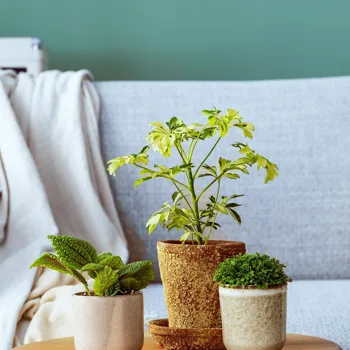Discover 8 Easy Ways to Make Your Home Eco-Friendly on a Budget! Let's save money and the planet together!
Nowadays, everyone's talking about going green and saving the planet, innit? But sometimes, it feels
like making your home eco-friendly means spending a bomb. Fear not, my friends! You can definitely do your bit for the environment without emptying your pockets.

We've got some simple, effective, and budget-friendly tips to transform your house into a sustainable haven. Let's get started and make "Dharti Maa" happy!
Switch to Energy-Efficient Lighting: Bulb Banao, Bill Bachao!
Right, let's begin with something super easy: changing your light bulbs. Those old-school incandescent bulbs are energy guzzlers. Replace them with LED (Light Emitting Diode) or CFL (Compact Florescent Lamp) bulbs.

LED bulbs are a bit more expensive upfront, but they last much longer and use way less energy, like almost 75% less! CFLs are a cheaper option, but LEDs are generally considered better for the long run.
Imagine, smaller electricity bills, and a greener conscience, all thanks to a simple bulb change. So, next time you are out shopping, make sure to buy the right bulb to save power! Switch off the lights when you leave a room, sounds simple right? But a lot of people forget.
Make everyone at your home follow this simple rule. This will ensure you use the lights only when it's required, ultimately saving electricity that goes into running them.
Unplug Those Phantom Loads: Switch Off, Save Money!
Even when you think your appliances are off, many are still sucking electricity, like silent vampires. This is called "phantom load" or "standby power." Charging adapters, TVs, and even your microwave can be guilty.

The easiest way to combat this is to unplug them when they're not in use or use power strips. Turning off the whole strip at once cuts off the power supply completely. Trust me, you'll notice the difference in your electricity bill.
This also will extend the life of the appliance as they will not be running unnecessarily. Especially, avoid charging your smartphone or laptop overnight, remove it when it is fully charged. Avoid keeping your appliances on charging. Doing this will help you save money and conserve energy.
Remember, every little bit counts.
Water-Wise Ways: Save Every Drop, People!
Water is precious, especially during the scorching summer months. There are tons of ways to conserve water at home without investing in fancy gadgets. Start with fixing leaky faucets – even a small drip can waste gallons of water over time. Take shorter showers.
You don't need to spend half an hour under the shower, singing Bollywood songs! A quick, efficient shower will do the trick. When washing dishes, don't let the water run continuously and when doing laundry, make sure you have a full load to maximize water usage.
Consider installing low-flow showerheads and faucet aerators. These are relatively inexpensive and can significantly reduce water consumption. Also, reuse water from washing rice or vegetables to water your plants. Every drop saved makes a big difference.
Embrace the Power of Plants: Har Bhara Ghar, Shudh Hawa!
Plants are not just pretty to look at, they're natural air purifiers. They absorb carbon dioxide and release oxygen, making your home a healthier and more pleasant place to live. Plus, they help regulate temperature and humidity.

Invest in some indoor plants like snake plants, spider plants, or money plants. They are easy to care for and require minimal sunlight. You can even grow herbs in your kitchen garden and have fresh ingredients at your disposal.
Not only will you be contributing to a greener environment, but you'll also be adding a touch of nature to your home. Plus, taking care of plants can be quite therapeutic, reducing stress and improving your well-being.
Reduce, Reuse, Recycle: The 3 R Mantra!
This one's a classic for a reason. Reducing consumption, reusing items, and recycling waste are fundamental to eco-friendly living. Before buying anything new, ask yourself if you really need it. Opt for products with minimal packaging and avoid single-use plastics.
Reuse containers, jars, and bottles for storage or other purposes. And, of course, recycle everything you can – paper, plastic, glass, and metal. Set up separate bins for different types of waste to make recycling easier. Composting of organic waste will help reduce waste.
If your local municipality doesn't offer recycling programs, explore private recycling centers or organize community recycling initiatives, reduce your carbon footprint.
DIY Cleaning Products: Chemical-Free Cleaning, Happy Home!
Those store-bought cleaning products are often loaded with harsh chemicals that are harmful to the environment and your health. The good news is, you can easily make your own cleaning solutions using natural ingredients like vinegar, baking soda, lemon juice, and essential oils.

Vinegar is a great all-purpose cleaner and disinfectant. Baking soda is effective for scrubbing and deodorizing. Lemon juice can be used to remove stains and brighten surfaces. There are tons of recipes available online for DIY cleaning products.
Making your own cleaning solutions is not only eco-friendly, but also saves money and avoids exposing your family to harmful chemicals. So, ditch those chemical concoctions and embrace the power of nature.
Smart Thermostat Settings: Temperature Control, Energy Savings!
Adjusting your thermostat settings can significantly reduce your energy consumption. During the day, especially when you're not home, set your thermostat a few degrees higher in the summer and lower in the winter. This can save you a considerable amount on your heating and cooling bills.
Consider investing in a programmable thermostat that automatically adjusts the temperature based on your schedule. Smart thermostats offer even more features, such as remote control and energy usage tracking.
By optimizing your thermostat settings, you can create a comfortable and energy-efficient home environment.
Buy Local and Seasonal: Support Local, Reduce Emissions!
Whenever possible, buy local and seasonal produce. This reduces the carbon footprint associated with transporting goods over long distances. Farmers markets are a great place to find fresh, locally grown fruits and vegetables.
Buying local also supports local farmers and businesses, boosting the local economy. Plus, seasonal produce tastes better and is often more nutritious. Check your local farmer's markets for vegetables and fruits and bring the vegetables to cook at home.
In total, you will be contributing to the environment for a healthier lifestyle. When you are mindful and conscious about the environment around you, it will push you to do better as well.
AI Generated Content. Glance/InMobi shall have no liability for the content












